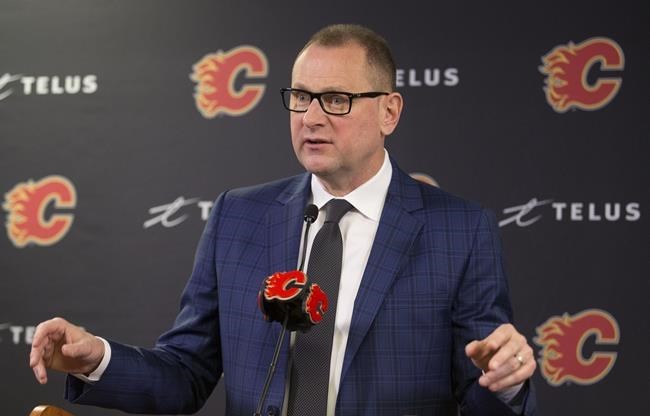CALGARY — Where, when and how are Calgary Flames general manager Brad Treliving's questions for the NHL as the league considers a hub-city concept to resume the season.
There were 189 games left March 12 when the NHL suspended the regular season in the face of the oncoming COVID-19 pandemic.
The league is kicking the tires on different scenarios under which games might resume if and when public health officials give the green light. The latest is teams travelling to four hub NHL cities to play games without fans in a compressed timeline.
"I can tell you the league is still committed and eager to get back when the time is right," Brad Treliving said Friday in a conference call with reporters.
The Flames were in playoff position sitting third in the Pacific Division with a 36-27-7 record when the NHL pressed pause.
Alberta premier Jason Kenney and NHL commissioner Gary Bettman had a conversation this week about Edmonton as one potential hub, but there are no indications yet that Calgary is a candidate.
"Certainly we would love to be involved in terms of hosting," Treliving said.
"That conversation, if it happens, happens above my pay grade. They're maybe looking at a bunch of different locations if they go down that route."
If the NHL goes that route, top-of-mind questions for the Flames GM include whether training camps be held at home or in the hub city, how large can a team's travelling contingent be and what hotel logistics look like.
"Certainly a number of issues to work out, but I think those are easily done once you have a format put together," Treliving said.
"It's always encouraging when you hear plans being discussed and you get a little feel for how we might look when we get on the other side of this thing."
Alberta reached 3,720 cases of infection — 1,357 recovered — and 67 deaths Friday when the City of Calgary extended a ban of public gatherings on city-owned land to Aug. 31.
When the ban to June 30 was announced earlier this month, Mayor Naheed Nenshi said it included NHL and CFL games should those leagues resume before then.
"The current rule from Alberta Public Health is that gatherings over 15 people are not currently allowed," Nenshi said Friday.
"Professional sport, even training camp, do not at this time have an exemption. It is certainly possible . . . that you might be able to see something happen for training camp."
Treliving is adamant players require training camp before a season could resume.
"We're going to be approaching two months here and in a lot of cases, even after the season players don't take this much time off," he said.
"You need reps. We'll be going from zero to 60 here pretty quick. The last thing you want to do is bring people back and all of a sudden you've got a rash of injuries."
Both Treliving and Bettman have said training camp should be three weeks.
Former NHL goaltender and television commentator Kelly Hrudey disagrees players need that long to prepare based on his experience during the 1994-95 lockout when he was a Los Angeles King.
"I believe we only had four days to get ready," Hrudey said. "My point being, I heard reports yesterday the teams are going to need three weeks.
"You don't need that long. These guys are machines. You can get to 60 miles an hour in a hurry."
The NHL has also floated the idea of a June entry draft, which spawns another raft of questions about logistics.
Treliving says he and his scouts watched the first round of the NFL draft Thursday to research how a remote draft might work. NFL commissioner Roger Goodell announced picks and transactions. Teams' general managers and coaches were visible via cameras in their own homes.
"The most challenging thing was you've got a coach, a manager, personnel people and your scouts all in different locations," Treliving observed.
"You need a bunch of phone lines because you're talking to a bunch of different people.
"There's not as many trades traditionally in the NFL as there are in the NHL. Most of their deals are move-up and move-down scenarios."
This report by The Canadian Press was first published April 24, 2020.
Donna Spencer, The Canadian Press


